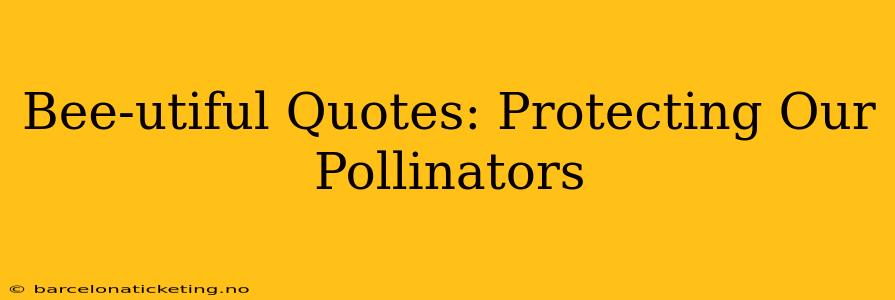"Not all those who wander are lost." This quote by J.R.R. Tolkien, while not explicitly about bees, perfectly encapsulates the vital, often unseen, journeys of these pollinators as they flit from flower to flower, ensuring the continuation of life as we know it. Bees, along with other pollinators like butterflies and hummingbirds, are essential for the reproduction of a vast number of plant species, impacting our food security, ecosystems, and overall biodiversity. The decline in pollinator populations is a serious concern, demanding our urgent attention and collective action. This article delves into the importance of pollinators, explores the threats they face, and offers practical steps we can all take to protect these vital creatures.
Why are pollinators important?
Pollinators are the unsung heroes of our food system and ecosystems. They facilitate the transfer of pollen, enabling plants to reproduce and produce fruits, seeds, and nuts. Roughly one-third of the food we consume relies directly or indirectly on animal pollination. This includes many fruits, vegetables, nuts, and even coffee and chocolate! Beyond food production, pollinators contribute to the health and diversity of our ecosystems, supporting plant communities that provide habitat for countless other species. Their contribution is truly immeasurable.
What are the biggest threats to pollinators?
Several factors contribute to the decline in pollinator populations. Understanding these threats is crucial to developing effective conservation strategies.
Habitat Loss and Degradation:
What is habitat loss and how does it affect pollinators? Habitat loss is the primary threat. As natural habitats are converted to agricultural land, urban areas, and infrastructure, pollinators lose their nesting sites, foraging grounds, and sources of nectar and pollen. Intensive agriculture, with its monoculture cropping and pesticide use, further degrades habitat quality.
Pesticide Use:
How do pesticides harm pollinators? Many commonly used pesticides are highly toxic to bees and other pollinators. Exposure can lead to direct mortality, impaired foraging ability, and weakened immune systems, making them more susceptible to diseases. Neonicotinoids, in particular, have been implicated in widespread pollinator declines.
Climate Change:
How does climate change affect pollinator populations? Climate change disrupts the delicate balance of ecosystems, altering flowering times and affecting the availability of resources for pollinators. Changes in temperature and precipitation patterns can also impact pollinator life cycles and distribution.
Disease and Parasites:
What diseases and parasites threaten pollinators? Pollinators are susceptible to various diseases and parasites, some of which are exacerbated by habitat loss and pesticide use. These pathogens can weaken populations and increase mortality rates.
What can we do to help protect pollinators?
We can all contribute to pollinator conservation efforts, even in our own backyards.
Plant Pollinator-Friendly Plants:
What types of plants attract pollinators? Plant a diverse range of native flowering plants that provide a continuous supply of nectar and pollen throughout the growing season. Choose plants with different bloom times to ensure a consistent food source.
Reduce Pesticide Use:
What are the alternatives to pesticides? Minimize or eliminate the use of pesticides in your garden and support policies that encourage sustainable agricultural practices. Explore organic gardening methods and natural pest control options.
Create Habitat:
How can I create habitat for pollinators? Provide nesting sites for bees and other pollinators by leaving patches of undisturbed ground, creating bee hotels, or planting shrubs and trees that offer shelter.
Support Sustainable Agriculture:
What is sustainable agriculture and how does it help pollinators? Support local farmers and businesses that prioritize sustainable agricultural practices, reducing their reliance on harmful pesticides and promoting biodiversity.
Educate Others:
How can I spread awareness about pollinator conservation? Share information about pollinator conservation with friends, family, and your community. Educating others is essential for generating broader support for these vital conservation efforts.
By taking these simple yet impactful steps, we can collectively contribute to a healthier future for pollinators and a more sustainable world for all. The buzzing of bees, the fluttering of butterflies, these are the sounds and sights of a thriving ecosystem, a testament to the beauty and importance of biodiversity. Let's work together to ensure these sounds continue to resonate for generations to come.

